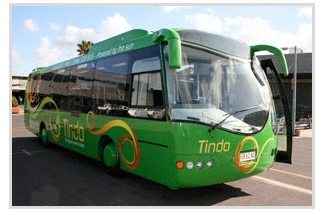40 years ago in Adelaide I didn’t even know the name of the people whose country was officially invaded on 28 December 1836. Last Christmas walking in the city, I saw:

It’s Tindo, a free solar-powered connector bus running around Adelaide. Tindo is the Kaurna word for ‘sun’, and the choice of name was discussed and authorised by Kaurna Warra Pintyandi, the Kaurna language committee.
And at an Anglican church in an eastern suburb, I heard:
“We pray for your world. We thank you for the Kaurna people who for many thousands of years cared for the land on which we now worship” [1]
It’s all quite unremarkable. Kaurna language and Kaurna people are now part of everyday life.
Today [thanks Nick!] I learned that endangered languages and their documenters have become so much part of everyday life that a comedian could joke about them in 2007. See the Colbert report interviewing the FiFo linguist, K. David Harrison.
Colbert seesaws between taking the micky out of the (dangerous) Every word is sacred argument, and drawing on the “Me Tarzan/Ching chong chinaman” stereotype of foreign languages. With a dash of linguists being in it for the grant money. And then the utilitarian punch of – So has your book been translated into an endangered language?
Is your blog written in an endangered language?
St David’s Church, Burnside. “Prayers of the people” prepared by Elizabeth Brissenden and her grandson Miles Farnan. 25/12/2008
 Follow
Follow